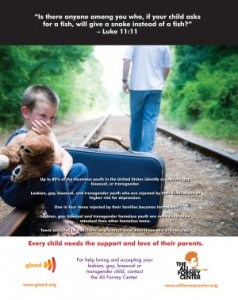Topics:
Search for topics or resources
Enter your search below and hit enter or click the search icon.
September 6th, 2011 | 5 min read

Sojourners, the leading organization of the evangelical left, can’t seem to escape the controversy that erupted in March when it rejected an advertisement from Believe out Loud, an organization trying to “significantly increase the number of local churches and denominations that are fully-inclusive of LGBT individuals, both in practice and policy.”
The ad that is ostensibly in question is a relatively innocuous affirmation of hospitality toward a lesbian couple with a child.
“Ostensibly” is the key word, though, because unless Sojourners is lying on their website, they didn’t reject the video at all.
But they did turn down email and online advertisements aimed at getting people to “Join the Campaign” and directing people to the Believe Out Loud website. Sojourners’ argues the advertisement was designed to get people to ascribe to Believe Out Loud’s mission of full inclusion for gays and lesbians into the practices of the church (including, clearly, marriage and ordination), a stance that they are noncommittal on and have determined is outside their core issues of poverty, race, and social justice.
Yet the ongoing confusion over the events has enabled Believe Out Loud and a host of other writers within the gay community to unfairly portray Sojourners as hostile to gays and lesbians because of their alleged skittishness at the video’s contents. In Sojourner’s defense, though, at the time of the controversy they embedded the video on their blog and Communications Director Tim King suggested that it makes a statement that “needs to be heard in more churches.”
 Now Sojourners has accepted a print advertisement from GLAAD calling attention to the problem of homelessness among gay and lesbian youth, and has determined to run a series of blog posts on the issue as well. Ross Murray, Director of Religion, Faith, and Values for GLADD described the moves as “wonderful steps forward for Sojourner’s Magazine,” while Daniel Villereal at Queerty suggested that Sojourners has “seen the light.”
Now Sojourners has accepted a print advertisement from GLAAD calling attention to the problem of homelessness among gay and lesbian youth, and has determined to run a series of blog posts on the issue as well. Ross Murray, Director of Religion, Faith, and Values for GLADD described the moves as “wonderful steps forward for Sojourner’s Magazine,” while Daniel Villereal at Queerty suggested that Sojourners has “seen the light.”
Yet Joseph Ward, III, the Director of Communications for Believe Out Loud, wasn’t satisfied:
The rejected Believe Out Loud ad explicitly encouraged Christians to be welcoming of LGBT persons in their churches. The accepted homelessness ad is only tangentially related to the church.
No one is going to confuse me for a progressive Christian, which makes me an outsider to this conversation.
But as something of a vocal conservative who cares about preserving a civil and hopefully even charitable public dialogue about matters in the public interest, Believe Out Loud’s misrepresentation of Sojourner’s decision troubles me. By conflating “welcome” with “affirmation” and implying that Sojourners is suspicious of both, Believe Out Loud’s rhetorical stance ends any discussion before it begins, rendering conservative readings of Scripture intrinsically unwelcoming and inevitably pushing them to the margins.
This, I submit, is bad for everyone. If nothing else, it engenders a defensive posture among the very people that Believe Out Loud is (ostensibly) trying to reach with their message of inclusion. I recognize that social movements of the sort they are trying to bring about are rarely attained through persuading the differently minded. But the church is not a social movement like any other. It is a community that bears witness to the love of Christ. And as I point out in Earthen Vessels, how we discuss these issues within our community bears witness to that love as much as the conclusions we come to does.
I originally voiced support for Sojourners on precisely these grounds, and would reiterate that support, albeit with some qualifications. In searching for common ground within the domain of common grace, we Christians might find ourselves allied with the most surprising of allies. And speaking out against homeless young people who are gay or lesbian is one such realm.
Yet at the same time, it is nearly impossible to neatly isolate issues from each other (as Sojourners is no doubt being reminded of). When speaking against the homelessness of young people who are at risk because of their sexual orientation, Christians must do so on grounds that do not rest upon and reinforce the problematic presuppositions that sometimes stand beneath the advocacy work. We speak out precisely because they are fully humans, made in the image of God, and who are meant to be welcome within the unconditional love of the family–regardless of their sexual orientation.
Whether GLAAD’s advertisement meets that standard is, to me, an open question. It was consciously submitted as a test case and so came loaded with political presuppositions, and has been heralded as an incremental step toward gaining Sojourner’s support for full equality. Both the motivation of the ad and the response are unfortunate, as they potentially reduce the issue under discussion to the question of whether they move the chains in the political football game of gay marriage. And GLAAD’s explicitly stated intention to pressure Sojourners to work on other issues that are more narrowly defined along sexual-orientation lines means that the challenge of avoiding an explicit statement on gay marriage, one way or the other, is only going to get more difficult.
Such is, however, the closed discussion world in which we live and which Sojourners is trying to navigate. Decisions like this one are hedged in by a broader discourse that makes moderate positions nearly impossible. And that is why, despite my reservations, I respect the line Sojourners is trying to take. It may not be ultimately be tenable, and they will doubtlessly have their critics from every side, but in the meantime their struggle keeps open the possibility of a position on homosexuality that is welcoming without sanctioning within the church. And for that, this conservative is grateful.
Matthew Lee Anderson is an Associate Professor of Ethics and Theology in Baylor University's Honors College. He has a D.Phil. in Christian Ethics from Oxford University, and is a Perpetual Member of Biola University's Torrey Honors College. In 2005, he founded Mere Orthodoxy.
Topics: